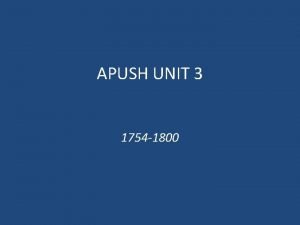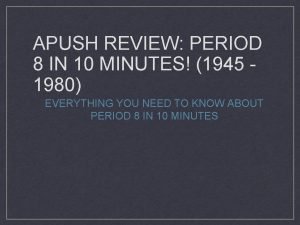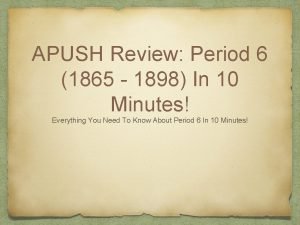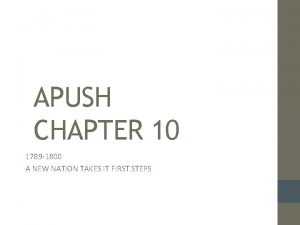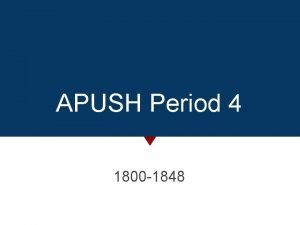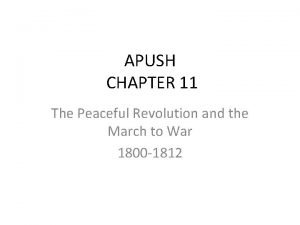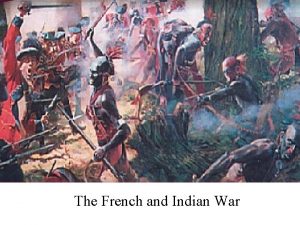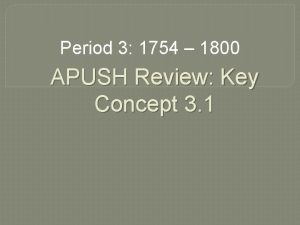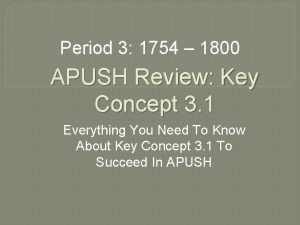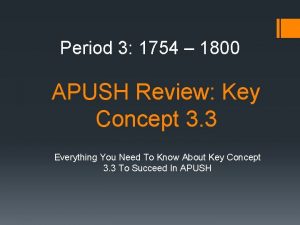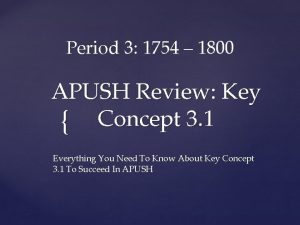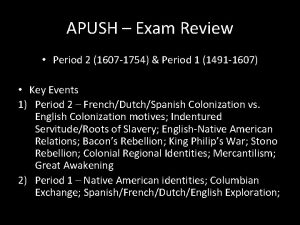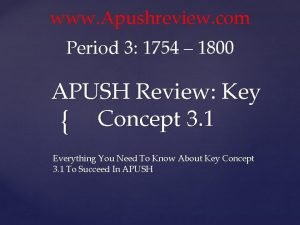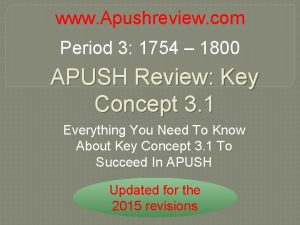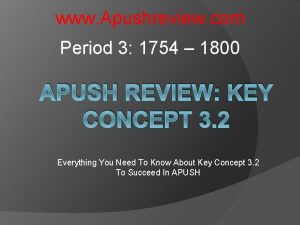APUSH REVIEW PERIOD 3 1754 1800 13 Everything











- Slides: 11

APUSH REVIEW: PERIOD 3 (1754 – 1800) - 13% Everything you need to know about Period 3

1754 - 1763 • French and Indian (7 Years War) was caused by English encroachment onto French lands • Most natives (except Iroquois – split) sided with the French • Great Britain wins the war, France is removed from North America • Conflicts emerge between American colonists and Natives as colonists seek to expand • Pontiac’s Rebellion -> • Proclamation Line of 1763

1763 - 1776 • Britain is in debt from the war, ends salutary neglect, takes a more active role in colonial affairs • Stamp Act, Townshend Acts, Intolerable Acts, etc. • Colonists resist this new control: • Stamp Act Congress, Committees of Correspondence, First Continental Congress • Elites and everyday colonists were united against the British • Up until 1776, most colonists did NOT want independence, rather they longed for salutary neglect

1776 - 1783 • Common Sense: • Thomas Paine, urged America to break away • Helped influence the Declaration of Independence • Declaration of Independence: • Grievances against KG 3, justification for breaking away • Inspired by Common Sense and other Enlightenment ideas – natural rights, consent of the governed, etc. • Why did the colonists win the war? • Familiarity with the land • Military leadership (Washington) • Strong beliefs (natural rights) • Foreign Aid – France after Saratoga

1783 – 1800 • Fear of centralized power helped create the Articles of Confederation • Weak central government, could not tax, no executive branch, most power left to states • Trade issues emerged between states • Northwest Land Ordinance (1787): • Provided a process for admitting new states • Once a territory reached 60, 000 people, it could apply for statehood • Banned slavery in NW Territory (MI, OH, IN, IL, WI) • Tensions emerged in different areas of the country (west v. east) • Paxton Boys (PA) – Scots-Irish protested Quaker’s lenient treatment of natives • Shays’ Rebellion (MA) – farmers protested unfair taxes

1783 – 1800 (Cont. ) • Impact of the D. of I. and American Revolution? • Revolutions in France, Haiti, and Latin America • Although some called for greater equality (Abigail Adams, PA Emancipation Law), framers of the Constitution postponed the issue of slavery • Constitution: • Built on Compromises: Great, 3/5, Slave Trade • Ratified after Federalists promised Antifederalists a Bill of Rights would be added

1783 – 1800 (Cont. ) • Challenges to the new government: • Navigation on the Mississippi River (Spain) • Pinckney’s Treaty • Relations with Natives (not defined in the Constitution), land issues as Natives ceded more and more land • Washington’s Farewell Address: • Warned of: entangled foreign alliances and political parties • Parties emerged anyway: Federalists (Hamilton) and Republicans (Jefferson) • Debates over power of government: • State vs. National – VA and KY Resolutions. • Can states nullify a federal law? • (NO! Constitution is “Supreme Law of the Land”) • Debate would continue until the Civil War

1783 – 1800 (Cont. ) • Republican Motherhood: • Women gained few, if any rights, after Rev. War • Women were expected to instill Republican virtues (liberty, natural rights, etc. ) in children, and be active in their families • Helped improve education for women

Short Answer Practice Answer All 3 Parts: 1. Briefly explain the British view of how the Seven Years’ War fundamentally changed the relationship between Britain and its American colonies. 2. Briefly explain the colonial view as a result of the war. 3. Briefly describe an initial reaction taken as a result of the changing views by either the British or colonists.

DBQ Practice To what extent was the demand for no taxation for representation both the primary force for motivating the American revolutionary movement and a symbol of democracy? (pp. 127 -129)

Long Essay Practice For some historians, the role of enslaved African Americans and American Indians before and during the Revolutionary War had a significant influence on events. Support, modify or refute this contention using specific evidence.
